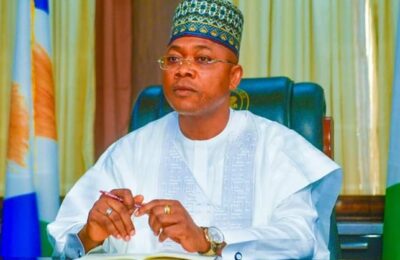Spread the love
Economic Indices
Population: 3,314, 043
GDP: US$4,642
Money supply: -50%
Economic Expansion: -20%
Unemployment Rate: 50%
Human Development Index: 90% survives on less than US$1 a day
Highest Exports: Cement, Marble, Cassava, Raw Rice, Fish, Timber, Gold, and Calamite, Coal
Highest Import: Automobiles, Motorcycles, Garment, Wheat, Rice, petroleum, Diesel
Manufacturing rate: 1%
Highest Employer: Subsistence Agriculture (70%)
Economic structure: Civil Service state
The Problem With Kogi State Economy(An Economy Without Stimulation)
Non-Payment of Salaries and Pension
In the rural area there is hyper inflation already, in the next few months if the Economy is not given desired attention the township areas especially Lokoja Inflation will soon hover above 50%. Fundamentally Kogi state is a closed economy and a civil service dependent state therefore the multiplier effect of issues relating to salaries and pension payment is enormous.
The impact of backlog of salaries, payment of half salaries and non-payment of pensions both at the state and Local government level leads to Inflation. When salaries are not paid: consumptions fall, supply remains stagnant, and demand falls, this leads to higher cost of input, and in the long run inflation sets in.
Lack of Industrialization
The second factor is lack of industries the only major industry is in Obajana; the cement industry has a linear operation both in practice and management therefore the downs stream sector of the industry has a negligible impact on the larger economy of Kogi state.
Government Expenditure
There are three ways, which the government stimulates, the economy: 1. Wages, and salaries 2.Contracts, and 3. Public Investment. In the state the issue relating to wages and salaries remain unsolved till today, Local contractors have not been patronized in adequate proportion, while there might have been public expenditure, the public investment is nil.
National Recession
Nigeria has been immersed in a deep neck recession in the last two years; Kogi state is part of it and they also experience their own share of it. The Recession also played a critical role in shrinking the economy of Kogi State
The Private sector
Presently the private sector is squeezed; the consumer inflation is affecting the private sector, for most business unit in the state; turn over have reduce by well over 40% and profit has reduced by as much as 70%(based on data from the state capital) the rural area could even be worst off. This scenario is understandable because of some basic facts: There is inflation in the national economy, at the state level salaries and pensions are not forth coming or irregular, local contractors are not patronized and there are no public investments at the moment, there are no industries and the service sector is not existing.
Ultimately the re- investment level of the economy is shrinking by the day because of the inflation, this in itself is increasing unemployment and deepening the inflation and poverty further.
The two highest selling commodities are foodstuffs and pharmaceutical drugs
When this high level of consumer inflation sets in people are forced to reserve their meager resource to feed and buy drugs. This are the kind of moment when people find it difficult to pay house rent, pay school fees, build houses, buy cars and indulge in capital projects unfortunately the private sector will continue to shrink until the economy is stimulated.
What people are facing now in the state is similar to what people call famine in the biblical eras : hunger, suffering and want.
The Big Picture
The greatest problem that has befallen Kogi state till date is lack of competent leadership. The types of government that will shepherd the state economy to prosperity are those that can see the big picture. Mauritius has half the population of Kogi State (1.5million) yet by all standard has a nation she is even more prosperous than Nigeria with a GDP of US$12.16billion, Botswana has a population of 2.25million (less than Kogi) with a GDP of US$16.29billion.
In 2017 Kogi state budget is $482,663,820 but Guinea Bissau is a country with a budget of $394milllion. Dominica is also country with a budget of $396 million, Sao Tome is a country with a budget of $235million, Comoros is a country with a budget of $350million, and the Central African Republic has a budget of $491 million. Kogi state is by far richer than about six (6) African Countries, and at the home front Kogi is financially richer than a minimum of ten state if not more. As poor as Kogi state is, she is endowed with mineral resources above 20 African countries and more endowed than over 50 countries in the world
The Way Forward
Kogi State is not poor but her leaders are too poor in ideas, poor intellectually, poor in the mind, and poor in leadership and as such they have condemn Kogi state economy to an emporium of poverty.
There is no magic, propaganda or ceremony that can do it. What will turn around Kogi State economy is industrialization and I just don’t know why successive government till date are afraid of leading Kogi state into an industrialize arena. For so long what Kogi state has been having is government of expenditure and not government of investment.
Kogi state economy must be opened up Lagos is what it is because she is an economic hub. The waterways have drawn various down stream and an upstream industry, Rivers state is a hub; the oil industries have magnificently drawn upstream and down stream industries to Rivers States. Kogi state is not a hub it is closed. The economy can be opened by industries and strategic infrastructural development. A single industry can even make the difference; look at what Nokia did to Finland. Nokia alone employs close to 60,000 people.
Just two or three industries with a very broad down stream sector will open Kogi state up for Good. Kogi state has cashed in over 1trilion naira since 1999 till date yet there is no single industry running! I wont go into details if the state government cannot take few millions to do research on industrialization then they are not worth the sit they are sitting on!
The state civil service is not the reason why Kogi state is poor rather the state is poor because of the recklessness and incompetence of successive government in the state. The state must do something about this salary and pension issue once and for all, in the history of mankind have never read, seen or heard of a country or a state that is at logger heads with her staffs that has progressed. If the state is tired of the civil service then they should engage them, lay them off and pay all their statutory entitlement.
Either government likes it or not the salary and pension issue is rubbing off on the image of the government home and abroad and it can give an impression of lack of economic stability which in itself is not favorable to investors.
– Hon Adeyemi Abidemi Adebola
Provost Institute of Disabled Persons (iDP)
Minority Whip (2011-2015), Kogi State House of Assembly
Founder, African Reading Project
Member, Kwame Nkrumah Research Institute
References:
Nigerian Gross Domestic Product Report(NBS)
Nigerian Poverty Profile (NBS)
Unemployment / Under – Employment report (NBS)
Labour Productivity)NBS)
Federal Account Allocation Committee(NBS)
Industrial development and growth in Nigeria Lessons and Challenges(L N Chete, J O Adeoti, F M Adeyinka And O Ogundele)
Mauritus: An economic success story
Finland: A success story
Emerging Economies Arrested development- The Economist
Overview of trade and barriers to trade in West Africa(Carmen Torres and Jeske Van Seters)
Nigeria Strategy Report 2017 (ARM)
Spread the love




